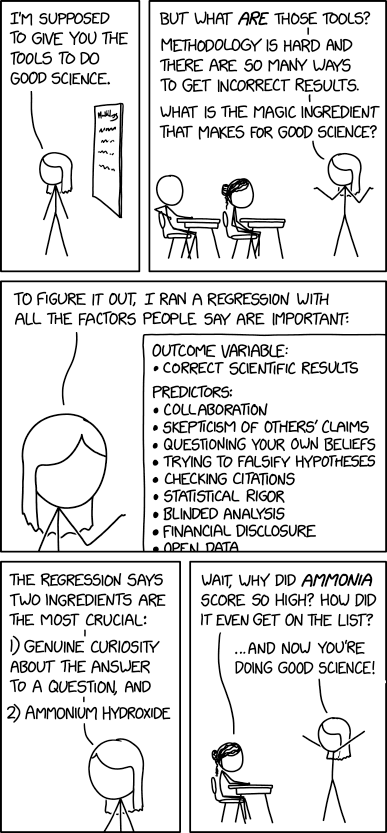Good Science

If you think curiosity without rigor is bad, you should see rigor without curiosity.

If you think curiosity without rigor is bad, you should see rigor without curiosity.
Miss Lenhart is teaching a class to Jill and a Cueball-like kid. Based on her opening statement "I'm supposed to give you the tools to do good science." this is likely a general class on the principles of science, although it could be the start of a class on a specific field of science such as biology or physics. Classes about the principles of science (i.e. the scientific method, or what makes "good science") are common at the very introductory level, such as middle school science classes that give young students a basic framework to understand science, and also at the very advanced level, where PhD students take classes on the philosophy and history of science with detailed examination of epistemology, metaphysics, logic and ontology to be able to understand how their research affects the world.
However, Miss Lenhart explains that doing "good science" is hard, because research often produces incorrect results. Most famously, it's been shown "by indisputably correct mathematical equations ... with the addition of only very modest assumptions" that in medical research, Most Published Research Findings Are False. She wonders what are the key things she should teach her students so that their scientific inquiry ends up being successful. She lists a series of items that are commonly suggested as leading to successful research, such as collaboration or skepticism, and explains that she performed a regression analysis (a mathematical technique often used in science), to find out which were most important. She concludes that the two most crucial factors are genuine curiosity about the subject (which makes sense as something that would drive scientists to achieve good results) and ammonium hydroxide, a chemical which does see some laboratory use, but it does not obviously relate significantly to achieving good results (although it's often used to clean laboratory equipment, so it is possible that regular or thorough cleaning of equipment reduces experimental error).[actual citation needed]
This may illustrate a potential problem with regression analyses caused by including too many predictor variables for the available data. This can cause random statistical noise in the sample to be interpreted as a meaningful effect.
When Jill points out that ammonium hydroxide is a nonsensical factor, Miss Lenhart replies that Jill is doing good science. The joke is that including ammonium hydroxide was just a means to get Jill to question the results. It also suggests that skepticism is actually the second crucial factor after genuine curiosity, as being skeptical of ammonium hydroxide as an important factor led to Jill's newfound success as a scientist. Alternatively, because Jill is being curious about how ammonia got onto the list, she is performing good science by using both curiosity and ammonia.
The title text addresses a common criticism in scientific circles that science is only good if it has rigor — that is, if it is well-documented and follows all of the proper procedure. It says that if curiosity without rigor is bad (in other words someone earnestly trying to figure out the answer, but doing it in a sloppy way) the opposite, rigor without curiosity, is much worse (a person who produces professional looking results but who doesn't care whether they are right or wrong). There are at least two issues with a scientist who is rigorous but uncurious. First is that, in the modern world, science has a very high social and cultural status, due to its incredible achievements over the past century and a half (from electric power to spaceflight to medical care). As a result, people tend to be very deferential to science, and the trappings of science (lab coats, clipboards, etc.) command respect. A rigorous but uncurious scientist could get people to believe more strongly in the wrong answer (for an example of how symbols like lab coats and clipboards can influence human behavior, see the Milgram experiment). Second, a rigorous scientist could become convinced of their performance because of their rigor, mistaking the outward process of science for science itself. In that case, beyond the initial wrong results due to their incuriosity, they could become resistant to changing their conclusions even when presented with decisive evidence to the contrary, sometimes to the point of suppressing other scientists who have reached the correct answer.
Randall has previously suggested that rigor is not as important in science as some make it out to be, when discussing MythBusters (see 397: Unscientific).